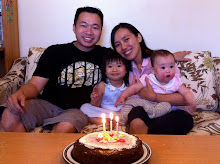I've recently been reading articles online and reading about education and many ideas are challenging what i would usually expect. We all know early reading program is in the rage these days, even i bought the "You can teach your baby to read" vcd series. I've been half-hearted about teaching it though, partially cos Eliza is only half interested in the vcds (except when the songs come on). That books series was fun cos it was a flip up book and Eliza loved seeing the pictures in it...so we talk about the pictures, though she flips it so fast i don't quite get to say much.
While Eliza loves her books, i'm not sure i want to push her to start reading so early now. And reading from these books, the time will eventually come when she is ready to learn reading.
i chanced upon this book
A Home Start in Reading by Ruth Beechick
Prereading
"...when and how to begin teaching 'reading'. First let's take up the question of when. That's very important. ...The early starters have read books about how to teach their baby to read. They have labels on furniture, appliances, and doors all over the house. Their baby plays with word cards every day. The late starters are more relaxed. They read books too-the 'late is better' variety. They read to their children. They teach them to cook and garden and help fix the car. And they won't be upset if a child doesn't show a desire to read until age eight or so.
Which of your friends are right? ...In walking between the extremes, we probably lean more toward 'late' than 'early', not because there is anything especially wrong with the early systems, but because we have seen more damage done to the early children. ...but it's too often an over-anxious mother pushing for it.
It is trus that some children can learn to read remarkably early. But the fact that they can does not necessarily mean they should. Should is another question. One school district set up an experiment to help decide this question. Some kindergartners in the district received extensive instruction in reading. Others spent the same amount of time learning science. They melted ice. ...Books and pictures were available for these children if they wanted them, but no formal lessons in reading were held.
What did the school district learn? By third grade the 'science' children were far ahead of the 'reading' children in their reading scores. The reason? Their vocabularies and thinking skills were more advanced. They could read on more topics and understand higher level materials. The reading children, by starting earlier, used up a lot of learning time on the skills of reading, while the 'science' children spent the time learning real stuff. And when they did begin reading, they were older and knew more and learned in a fraction of the time that the others took.
...They drive home the fact that each child has only a limited amount of time in his early years. That time can be squandered in trying to teach reading before the 'optimum' time for it. Or it can be used wisely in teaching 'real stuff' that the child is read for. ...
The real stuff your child learns does not have to be only science. Science is a natural because children are curious about the world around them, and you can capitalize on that curiousity. But you can teach also about music, art, literature, money, work, safety, God, people, and everything else you and your child are interested in.
All such teaching is 'prereading' instruction. It is getting ready for reading. Everything your child learns increases his vocabulary and develops his thinking skills.
Prereading instruction, then, is wider than the whole world. Teach about the cooking and cleaning going on in your kitchen. Teach good eating habits, nutrition, care of teeth. And teach about the stars and the God who made them. Solve problems. "
This is quite a old book...printed in 1985. But somehow i find these wisdom from books such as these really refreshing from the many education 'methods' today. (i'm also reading For the Children's Sake: Foundations of Education for Home and School by Susan Schaeffer Macaulay)
God help me to reflect on these things i'm learning so and learn to apply it in our lives.
Subscribe to:
Post Comments (Atom)




No comments:
Post a Comment